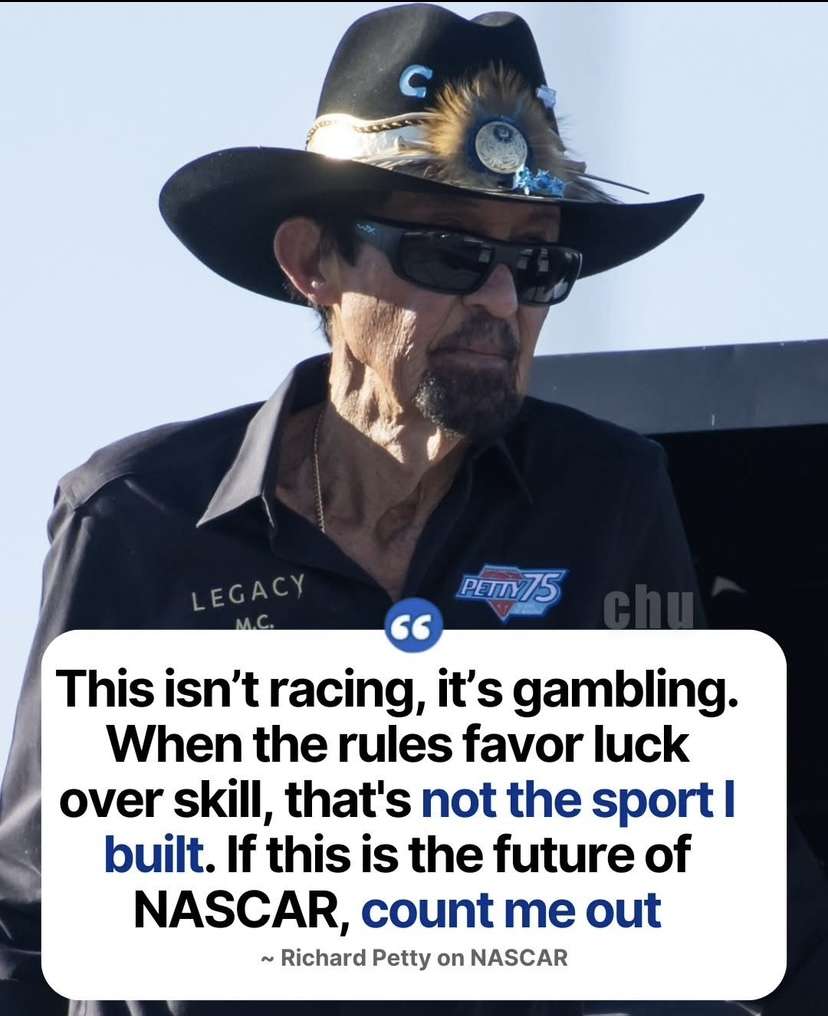
NASCAR legend **Richard Petty**, famously known as *“The King,”* has once again made headlines with his blunt honesty about the current direction of the sport he helped define. In a statement that’s stirred intense debate across the racing community, Petty declared,
*“This isn’t racing, it’s gambling. When the rules favor luck over skill, that’s not the sport I built. If this is the future of NASCAR, count me out.”* His words cut deep — not only because of who said them, but because they echo a growing frustration shared by many long-time fans and former drivers.
For Petty, whose legendary career includes **200 NASCAR Cup victories** and **seven championships**, racing was always about skill, endurance, and preparation. He built his empire during an era where drivers and crews worked tirelessly to create cars that could outlast and outperform the competition. Every victory was earned through precision, not chance. Now, however, Petty feels that modern NASCAR has shifted away from those roots. “You used to win because you were the best — not because you got lucky on a restart,” he once said.
Much of Petty’s criticism centers on NASCAR’s evolving rules and race formats, such as stage racing, overtime restarts, and the growing reliance on late-race cautions to keep fans entertained. These changes were intended to make races more thrilling and unpredictable for viewers, but to veterans like Petty, they’ve turned the sport into what he calls a “gamble.” When outcomes depend more on random incidents or strategic timing than raw speed or skill, Petty believes the integrity of the sport suffers. “Luck has always played a small part,” he’s explained before, “but when luck decides who wins, it’s not racing anymore.”
His frustration goes beyond just rule changes — it’s about identity. NASCAR, once a symbol of grit, innovation, and blue-collar determination, now feels increasingly like a product of television ratings and marketing decisions. The introduction of the **Next Gen car**, designed to make competition more equal, has also been divisive. While it’s succeeded in bringing parity among teams, Petty and other traditionalists argue that it has taken away the individuality and creativity that once made NASCAR special. In his view, racing has become too standardized, too controlled, and too reliant on spectacle rather than skill.
Many insiders have come to Petty’s defense, agreeing that the balance between tradition and entertainment has tilted too far. Former crew chief Larry McReynolds commented, “Luck should never determine a championship more than consistency or skill. That’s not what NASCAR was built on.” Even modern drivers, though cautious not to criticize the organization directly, have echoed Petty’s sentiment that the sport’s roots are slowly being forgotten in favor of crowd-pleasing formats.
Petty’s words also serve as a warning — a reminder that NASCAR’s greatest strength has always been its authenticity. The sport was built by people who worked in their own garages, who raced with passion and risked everything for glory. If racing turns into something determined by artificial excitement or unpredictable chaos, Petty fears it could lose what made it truly special. “We raced because it was in our blood,” he said. “Now it feels like we’re watching a show.”
Despite the controversy his comments have caused, few can deny the weight they carry. Richard Petty’s name is synonymous with NASCAR’s legacy, and when he speaks, the entire motorsport world listens. His criticism isn’t born out of bitterness or nostalgia — it comes from a deep love for the sport he helped build. And while NASCAR continues to evolve in pursuit of new audiences, Petty’s message is clear: innovation should never come at the cost of authenticity.
For “The King,” racing has always been about the purest competition — the best drivers, the fastest cars, and the toughest challenges. Anything less, in his eyes, isn’t racing at all.
Leave a Reply